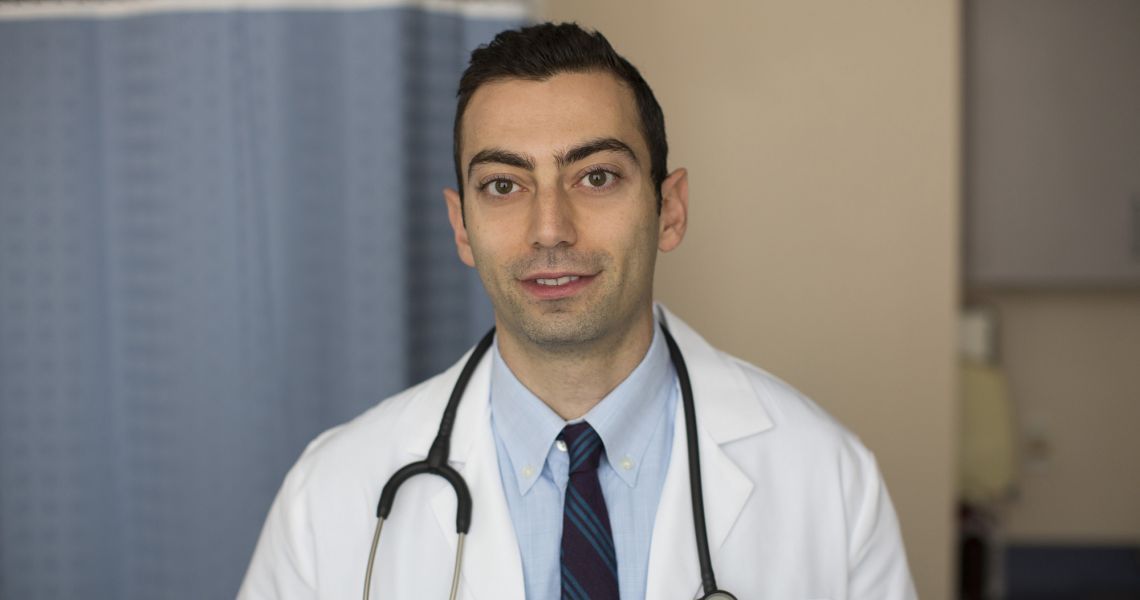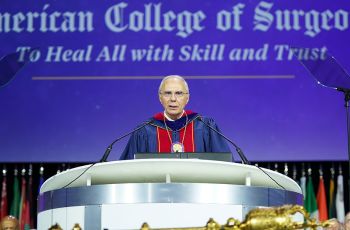Lung cancer is the leading cause of cancer death, according to the American Cancer Society, but there is hope; thanks to advanced early detection, novel treatments and therapies, and a decrease in smoking rates nationwide, lung cancer death rates are steadily dropping. With November as Lung Cancer Awareness Month, now is the time to continue that trend, especially if you’re a smoker or you’re at least 50 years old and due for a check-up. Here, Faysal Haroun, MD, a hematology and oncology specialist with the George Washington University (GW) Medical Faculty Associates and the GW Cancer Center, as well as an assistant professor of medicine in the Division of Hematology and Oncology at the GW School of Medicine and Health Sciences, walks us through the ins-and-outs of lung cancer risks, symptoms, and treatments.
Q. Who is most at risk for lung cancer?
Haroun: There are several risk factors for lung cancer; however, smoking is by far the most significant risk. Lung cancer rates increase as much as 20 times among patients who are active smokers or have a significant history of smoking. The majority (about 80%) of lung cancer deaths are related to smoking. Small-cell lung cancer, an aggressive type of lung cancer, is highly associated with smoking and rarely diagnosed in nonsmokers.
The risk of cancer increases with the number of years and number of packs of cigarettes consumed. Smoking cessation decreases the risk of lung cancer. Other forms of smoking, such as cigars, pipes, menthol cigarettes, and “light” cigarettes, are also associated with cancer, while the long-term cancer risk of vaping is still being studied.
Other nonsmoking risks for lung cancer include radon exposure, asbestos exposure, a history of radiation, and second-hand smoke.
Q. How early do you see symptoms, and what do they look like?
Haroun: Lung cancer can often present at advanced stages. Some symptoms of lung cancer include shortness of breath, an unrelenting cough, coughing up blood, and/or weight loss.
Q. Can patients do anything to reduce their risk of developing lung cancer?
Haroun: Smoking cessation is key to reducing the risk of cancer, and the earlier you stop smoking, the more significant the reduction in lung cancer risk.
Q. Who should get screened for lung cancer and when?
Haroun: The only currently recommended screening test for lung cancer is a yearly low-dose computed tomography (low-dose CT). Screening is indicated for patients with a significant history of smoking, defined by the U.S. Preventive Services Task Force as 20 packs per year or more, and those who are currently smoking, who quit within the past 15 years, or who are between the ages of 50 and 80.
Q. What does treatment typically involve?
Haroun: The treatment of lung cancer is dependent upon the stage and the subtype of lung cancer. Non-small cell lung cancer (specifically, adenocarcinoma) is the most common subtype of lung cancer.
Treatment of lung cancer has advanced rapidly over the last decade and now includes a combination of surgery, radiation, chemotherapy, immunotherapy, and targeted drugs. Genetic testing is often performed on some types of lung cancers to evaluate for specific mutations in the cancers that can, in some cases, be treated with oral targeted drugs. Clinical trials may also be an option for lung cancer patients who are eligible for enrollment.
Q. How does GW care for patients with lung cancer?
Haroun: At GW, we have a comprehensive approach to patients with lung cancer, with a dedicated team of specialists and support staff working to ensure the best quality of care for our patients and provide the needed support. Our team of specialists includes medical oncologists, thoracic surgeons, radiation oncologists, pulmonologists, radiologists, and palliative care physicians, with the support of a nursing care team and social workers.
To make an appointment at the GW Cancer Center, call 202-741-2210.




